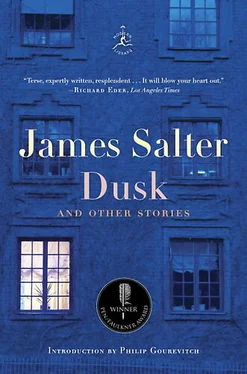She fled afterward. She went directly back to the Hotel de Ville. Her room was filled with objects. On the desk were books still wrapped in brown paper, magazines in various languages, letters hastily read. There was a small anteroom, not regularly shaped, and a bedroom beyond. The bed was large. In the manner of a sequence when the camera carefully, increasing our apprehension, moves from detail to detail, the bathroom door, half-open, revealed a vast array of bottles, of dark perfumes, medicines, things unknown. Far below on Via Sistina was the sound of traffic.
The next day she was better, she was like a woman ready to work. She brushed her hair back with her hand as she read. She was attentive, once she even laughed.
They were brought small cups of coffee from across the courtyard.
“How does it sound to you?” she asked the writer.
“Well…” he hesitated.
He was a wavering man named Peter Lang, at one time Lengsner. He had seen her in all her sacred life, a figure of lights, he had read the article, the love letter written to her in Bazaar . It described her perfect modesty, her instinct, the shape of her face. On the opposite page was the photograph he cut out and placed in his journal. This film he had written, this important work of the newest of the arts, already existed complete in his mind. Its power came from its chasteness, the discipline of its images. It was a film of indirection, the surface was calm with the calm of daily life. That was not to say still. Beneath the visible were emotions more potent for their concealment. Only occasionally, like the head of an iceberg ominously rising from nowhere and then dropping from sight did the terror come into view.
When she turned to him then, he was overwhelmed, he couldn’t think of what to say. It didn’t matter. Guivi gave an answer.
“I think we’re still a little afraid of some of the lines,” he said. “You know, you’ve written some difficult things.”
“Ah, well…”
“Almost impossible. Don’t misunderstand, they’re good, except they have to be perfectly done.”
She had already turned away and was talking to the director.
“Shakespeare is filled with lines like this,” Guivi continued. He began to quote Othello.
It was now Iles’ turn, the time to expose his ideas. He plunged in. He was like a kind of crazy schoolmaster as he described the work, part Freud, part lovelorn columnist, tracing interior lines and motives deep as rivers. Members of the crew had sneaked in to stand near the door. Guivi jotted something in his script.
“Yes, notes, make notes,” Iles told him, “I am saying some brilliant things.”
A performance was built up in layers, like a painting, that was his method, to start with this, add this, then this, and so forth. It expanded, became rich, developed depths and undercurrents. Then in the end they would cut it back, reduce it to half its size. That was what he meant by good acting.
He confided to Lang, “I never tell them everything. I’ll give you an example: the scene in the clinic. I tell Guivi he’s going to pieces, he thinks he’s going to scream, actually scream. He has to stuff a towel in his mouth to prevent it. Then, just before we shoot, I tell him: Do it without the towel. Do you see?”
His energy began to infect the performers. A mood of excitement, even fever came over them. He was thrilling them, it was their world he was describing and then taking to pieces to reveal its marvelous intricacies.
If he was a genius, he would be crowned in the end because, like Balzac, his work was so vast. He, too, was filling page after page, unending, crowded with the sublime and the ordinary, fantastic characters, insights, human frailty, trash. If I make two films a year for thirty years, he said… The project was his life.
At six the limousines were waiting. The sky still had light, the cold of autumn was in the air. They stood near the door and talked. They parted reluctantly. He had converted them, he was their master. They drove off separately with a little wave. Lang was left standing in the dusk.
There were dinners. Guivi sat with Anna beside him. It was the fourth day. She leaned her head against his shoulder. He was discussing the foolishness of women. They were not genuinely intelligent, he said, that was a myth of Western society.
“I’m going to surprise you,” Iles said, “do you know what I believe? I believe they’re not as intelligent as men. They are more intelligent.”
Anna shook her head very slightly.
“They’re not logical,” Guivi said. “It’s not their way. A woman’s whole essence is here.” He indicated down near his stomach. “The womb,” he said. “Nowhere else. Do you realize there are no great women bridge players?”
It was as if she had submitted to all his ideas. She ate without speaking. She barely touched dessert. She was content to be what he admired in a woman. She was aware of her power, he knelt to it nightly, his mind wandering. He was already becoming indifferent to her. He performed the act as one plays a losing hand, he did the best he could with it. The cloud of white leapt from him. She moaned.
“I am really a romantic and a classicist,” he said. “I have almost been in love twice.”
Her glance fell, he told her something in a whisper.
“But never really,” he said, “never deeply. No, I long for that. I am ready for it.”
Beneath the table her hand discovered this. The waiters were brushing away the crumbs.
Lang was staying at the Inghilterra in a small room on the side. Long after the evening was over he still swam in thoughts of it. He washed his underwear distractedly. Somewhere in the shuttered city, the river black with fall, he knew they were together, he did not resent it. He lay in bed like a poor student—how little life changes from the first to the last—and fell asleep clutching his dreams. The windows were open. The cold air poured over him like sea on a blind sailor, drenching him, filling the room. He lay with his legs crossed at the ankle like a martyr, his face turned to God.
Iles was at the Grand in a suite with tall doors and floors that creaked. He could hear chambermaids pass in the hall. He had a cold and could not sleep. He called his wife in America, it was just evening there, and they talked for a long time. He was depressed: Guivi was no actor.
“What’s wrong with him?”
“Oh, he has nothing, no depth, no emotion.”
“Can’t you get someone else?”
“It’s too late.”
They would have to work around it, he said. He had the telephone propped on the pillow, his eyes were drifting aimlessly around the room. They would have to change the character somehow, make the falseness a part of it. Anna was all right. He was pleased with Anna. Well, they would do something, pump life into it somehow, make dead birds fly.
By the end of the week they were rehearsing on their feet. It was cold. They wore their coats as they moved from one place to another. Anna stood near Guivi. She took the cigarette from his fingers and smoked it. Sometimes they laughed.
Iles was alive with work. His hair fell in his face, he was explaining actions, details. He didn’t rely on their knowledge, he arranged it all. Often he tied a line to an action, that is to say the words were keyed by it: Guivi touched Anna’s elbow, without looking she said, “Go away.”
Lang sat and watched. Sometimes they were working very close to him, just in front of where he was. He couldn’t really pay attention. She was speaking his lines, things he had invented. They were like shoes. She tried them on, they were nice, she never thought who had made them.
“Anna has a limited range,” Guivi confided.
Lang said yes. He wanted to learn more about acting, this secret world.
Читать дальше












